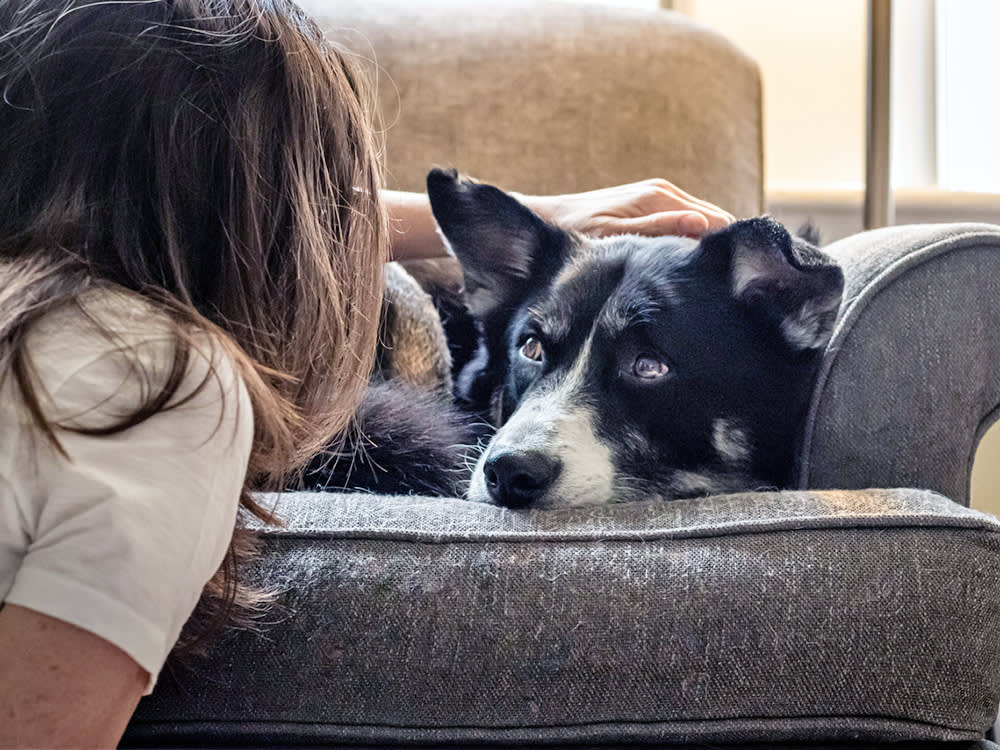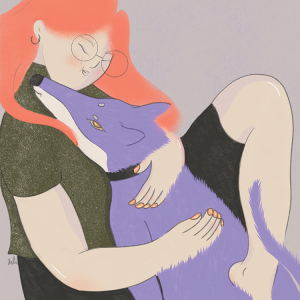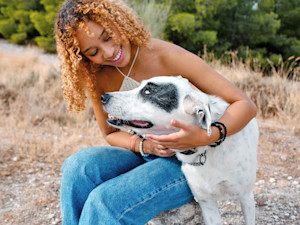Your Dog Is Judging You—Well, Only If She’s a Girl, Study Says
She is watching your every move.

Share Article
Yes, your dog is judging you. That is, if your dog is a female. Have a male dog? You may be living in a judgment-free zone. In other words, according to a 2022 studyopens in new tab, female dogs are more critical than the gymnastics judges at the Olympics. More so, they care about competence — they evaluate people and respond accordingly. Males don’t act the same way (at least not those observed in the study).
She may judge, just not about your ability to open a pickle jar.
In the study, researchers set up an experiment to investigate dogs’ ability to recognize competence in people and to see if they adjusted their own behavior depending on whether a person was or was not competent. Dogs watched two people try to open an empty container. One person was successful at opening it, and one person failed in their attempt.
The people then repeated this with a different container, with each person consistently either being the competent one or the incompetent one (mimicking real life for those of us who have never opened a pickle jar on their own). Then, the people simultaneously tried to open a third container, and researchers observed the dogs’ behavior. Half the dogs (30 of them) were watching people try to open containers with food inside and the other half (30 dogs) were watching people try to open empty containers.
The dogs were faced with a choice of heading over to the person who struggled to open the container or the person who opened it with ease. Although male dogs showed no preference for one person over the other, 83 percent of the female dogs chose to approach the person who was competent. There’s no evidence that the dogs were thinking, Game recognizes game, but I like to think that they were.

When faced with people trying to open empty containers, neither male nor female dogs showed any preference for competent people over incompetent people. That means these dogs cared more about competence when it mattered than when it was irrelevant. The female dogs had no reason to care about a person’s ability to open an empty container, which makes sense.
Dogs are careful observers.
Dogs have evolved alongside humans, and during the thousands of years they have closely associated with people, they have developed high-level abilities to pay attention to us and understand our behavior and emotions. They have previously been shown to distinguish between selfish and giving peopleopens in new tab (those who share treats versus those who want it all themselves), and friendly peopleopens in new tab versus people who paid no attention to them. Dogs benefit from associating with generous or friendly people, and they also gain resources if they choose to be around competent people rather than those who are incompetent.
Another difference between the males and the females in this experiment was that female dogs looked at the people for a longer duration of time. That is consistent with a number of studies that show differences between the sexes. Female dogs looked longer at pictures opens in new tab of dog and human faces than male dogs did. Females looked at their people more frequently and for a longer amount of time when they were stumped trying to solve a taskopens in new tab. They also looked at their people longer after being given oxytocinopens in new tab.
Future research is needed to explore whether dogs evaluate competence in other situations, and whether males ever pay attention to competence. For now, remember science only has evidence that points toward your sweet, smart, perfect (and yes, judgmental) girl dog.
References:

Karen B. London, PhD, CAAB, CPDT-KA
Karen B. London is a certified applied animal behaviorist (CAAB) and certified professional dog trainer (CPDT) who specializes in working with dogs with serious behavioral issues, including aggression. She has written for a variety of magazines including The Bark, Clean Run, and the APDT Chronicle of the Dog, and has published in scientific journals including Behavioral Ecology and Sociobiology, Ethology, Ecology, and Evolution, the Journal of Insect Behavior, and Insectes Sociaux. She is the author of seven books about dog training and canine behavior, including the forthcoming My Dog's Mystery Adventure: And Other Stories From a Canine Behaviorist and Dog Trainer.
Related articles
![Illustration of a woman hugging a dog]()
Your Dog Can Smell When You’re Stressed, New Study Says
Research finds that your pup can smell when you’ve been doom-scrolling, and they get bummed out.
![Woman looking into her Beagle dog's eyes.]()
Dog and Human Brains Sync When They Stare Into Each Other’s Eyes, New Study Finds
You and your pup are on the same wavelength—seriously.
![Woman hugging her dog outside.]()
Your Dog Can Understand Your Facial Expressions, Study Says
And they love it when you smile.
![A woman sitting on a floor playing with her dogs.]()
How to Know if Your Dog Has Imprinted on You
If they’re following you around like your shadow, there’s a reason for that.
![Angry pomeranian chihuahua pup on a dark gray background]()
Is Your Dog Giving You the Stink Eye?
Despite plenty of reasons to get mad, an animal behaviorist says dogs rarely express real anger.
Do Dogs and Cats Care What They Look Like?
They do seem to act different after a trip to the groomer, right?






